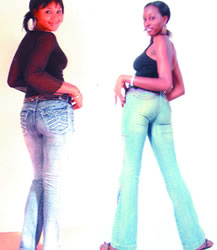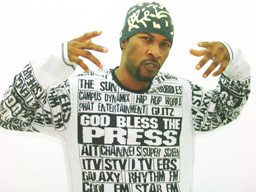
The hip hop world is an interesting community. Knowing no geographical boundaries, citizens (usually called headz) must have a certain level of all-round knowledge, an impressive understanding of the culture, a tested prowess in at least one of the elements and a self-ego the size of Jupiter.
Thanks to rap – the vocal language of hip hop- the culture has spread all over the world; throwing up big businesses and icons whose influence could rival that of the UN Secretary-General. But then, no thanks to rap (and its pathetic bastardisation), many ignoramuses across the world are mistaking rap (the rhythm and applied poetry that serves as the verbal projectile of hip hop) as the only element of the culture. Some even annoyingly refer to anything urbane (Rhythm & Blues, Soul, Dancehall) as hip hop. In the real sense, a rapper is different from a lyricist or emcee – although one man can do both. But elements as Deejaying, Beat-boxing, Graffiti and others are as important as rap.
Except for TeeMac (who ignorantly claimed that ‘hip hop is dead’ at a recent showbiz gathering), most headz who argue that hip hop is dying, base their argument on the over-glorification of commercial rap, at the expense of other core elements of the culture; the widely-held notion that true ol’ hip hop, driven by its original values and ideals has been sacrificed on the alter of commercialisation.
But while those who learnt from the feet of KRS One, Rakim Allah, Eazy E, Eric B, Run-DMC and the likes would quickly frown and argue that hip hop has been adulterated, and has been hijacked by outsiders; you’ll be surprised by the population of new school headz who think Lil’ Wayne and all the new boys from the south are the best thing to happen to hip hop.
Have the rulers of the kingdom; the custodians of the culture gone archaic, rusty and out-of-touch? Or are these enthusiastic teenagers who consider swagger more important than punch-lines losing the core essence of the forefathers of hip hop?
Is hip hop dead, dying, or alive than never before? Arguments for and against all three instances are raging in my head right now. So, I can’t say for sure, what the final submission should be, as I write. You might want to help me with your ideas and opinions.
However, what I do know for sure is that, beef, one of hip-hop’s ever-present nemeses, is well and alive. 2pac and the Notorious B.I.G may be long dead and gone; Jay Z and Nas may have since squashed their feud, but the ego and braggadocio-induced lyrical battles still remain. Even in Nigeria, where hip hop is ill-defined and anyone whose over-sized pants are sagging; or who walks with some sort of swagger is considered a hip hop head, you’ll find beef scattered around as if it’s ingredient for a sumptuous meal.
Apart from a few, most headz are not interested in correcting the misrepresentation of the culture or ensuring the redefinition of a true head. The rappers are dancing to the gallery, letting it known to us that it’s now all about the cheddar. As far as they are concerned, ‘‘hip hop can go to hell.”
Instead of adapting the elements of the culture to fit the Nigerian lifestyle, instead of cultivating the streets and making sure hip hop plays a role in politics, government policies and youth education, everyone is minding their business.
Some self-proclaimed emcee who has never ‘headlined’ a street corner gig, or engaged other folks in a hour-long freestyle session suddenly shows up on TV calling himself the king of hip hop and we’re all buying it.
And what’s he talking about? Bacardi, Hennessy, Swagger, Bling-bling and UNILAG girls. With such frivolous theme, watery rhymes, weak punch-lines, senseless metaphors and ‘‘I’m-throwing-sex-in-your-face’’ videos, why would the older, more ‘serious’ segment of society take the culture and its proponents with anything more than a pinch of salt?
As the likes of Mos Def, Talib Kweli, Common, Nas, The Wu Tang Clan, Russell Simmons, Jay Z and Dr. Dre have shown, hip hop is serious. As serious as any movement/artform can be. Yes there’s the beef. Yes there’s the violence. Yes there’s arrogance and drugs and all that. But there’s a lot of cultural responsibility too. There’s beautiful poetry. And true disciples continue to use the movement as a tool to shape societies into desired forms.
And here at home, we need to give rappers Ruggedman and Mode 9 some credit. While Rugged is adapting his art to suit the African situation, Modey is sticking to his game, hoping to prove that true hip hop knows no geographical boundaries.
Both rappers are gifted and truly hardworking, even though pundits argue that Mode is a better lyricist than Rugged. While Eedris Abdulkareem contributed in no small measure in bastardising the hip hop culture and the rap genre in Nigeria, Rugged and Mode belong to the category of those devoted to the eradication of the mis-education.
But both rappers have, for the past few years, been locked in a subtle battle for supremacy. They often deny it. But their lyrics say it. And now, at a time when they should both be concerned about the future of their careers (what with younger cats like M.I. Blaise, Gino and Kel lurking around), they’re taking the beef to a new level, embracing open confrontation and pouring lyrical venom on one another.
Two fresh songs – talking to you (Mode 9) and Banging (Ruggedman) – clearly depict the depth and direction of the new beef, and how each man is using his art to pass across his message.
But what lessons are they teaching younger cats? How’s the beef helping the growth of the culture in Nigeria. And is the battle just a wax affair, to settle the ‘‘who-s better’’ issue or some ego-driven personal stuff that may escalate to real-life violence? Or – as some are already insinuating- is it all just a stunt to get us all talking about them again and drive their songs to the top of the charts?
I’m still searching for answers.



















